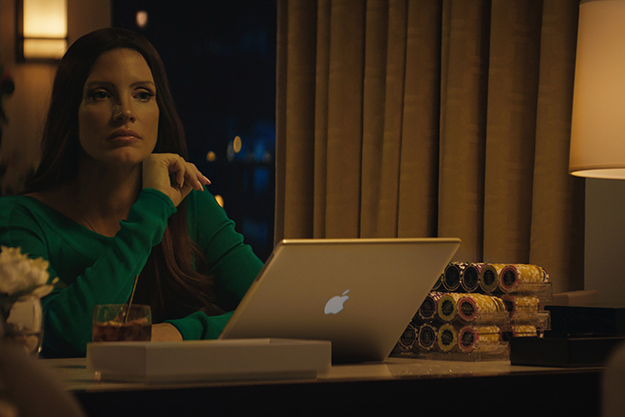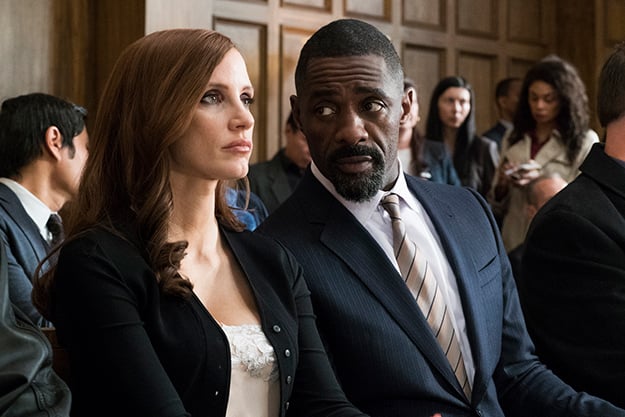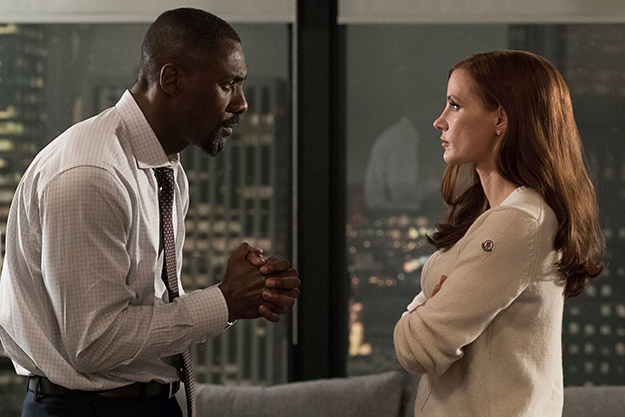Poker, as the heroine of Molly’s Game points out, is a game of skill, not of chance; and yet chance plays a key role in Aaron Sorkin’s movie. Impossible odds determined the fact that, in the youth of so-called “Poker Princess” Molly Bloom, this Olympic-level skier took a drastic, career-damaging tumble because she happened to make contact with a rogue piece of pine bough sticking out of the ground. Throughout Sorkin’s gambling story, it’s the fine distinctions, the thinnest lines between winning and losing, that change everything—just as, Molly recounts, in the 1936 Summer Olympics, record-breaking runner Matthew Robinson lost to the history-making Jesse Owens by only four-tenths of a second. Similarly, it only takes one fluke move by an inveterate loser to bring a hitherto unbeatable champ at one of Molly’s poker tables to irreparable defeat; and it takes one move for Molly, for the very first time, to take a rake on one of the games she runs, and instantly cross the line into illegality. Fine distinctions are of the essence in Sorkin’s film but may be a more elusive matter than is always apparent. In one sly scene, a lawyer advises Molly that what she’s doing in the games she hosts is perfectly legal in the sense that she’s not “actually” breaking the law. Such delicate qualifications say it all. A hint that we should approach this movie with caution comes in a scene where Molly (Jessica Chastain) tells her prospective attorney Charlie Jaffey (Idris Elba) that she has turned down several offers to adapt her 2014 memoir Molly’s Game (subtitled From Hollywood’s Elite to Wall Street’s Billionaire Boys Club, My High-Stakes Adventure in the World of Underground Poker). The implication is that Sorkin’s film is the real deal when it comes to Bloom’s experience; or at least, that it’s the approved deal. It’s worth taking the film, then, with a pinch of salt: Molly’s voiceover account comes across with a certain degree of self-aggrandizement. As is often the case in such autobiographical confessionals, she presents herself as something of an exemplary American picaresque heroine. The story insistently presses the case that, whatever the follies, lapses and imperfections of Molly’s career and character, she pursued her path with commendable ethics—refusing to name names, no matter what the rewards, and taking care not to destroy lives either in her game-running or her writing. This movie is anything but a gloating chronicle of ain’t-I-a-stinker? amorality, although the film it rather resembles, albeit in a very different key, is Scorsese’s The Wolf of Wall Street, based on the memoir of financial shark Jordan Belson. Molly’s Game resembles The Wolf partly because the voiceover narration leads us through a whirlwind show-and-tell of Molly’s career, which Sorkin’s visuals often illustrate with disappointing literalness (she tells it, he shows it). And Sorkin’s style is often routinely Scorsesean, every card game and every set of moves Molly jazzed up with quick-fire cutting (plus occasional superimposed on-screen captions and card diagrams for the instant edification of non-players). What you don’t get here, however, is ironic distance of the sort that Scorsese (along with many imitators) employs in The Wolf of Wall Street, Casino, and elsewhere. In Molly’s Game, what you see is pretty much what you get, but perhaps that’s part of the deal: Sorkin wants to reassure us that, unlike most of the people she deals with, Molly Bloom (and her story, and his film) are absolutely aboveboard.
This makes for a rather dry narrative, and one in which—true to the patented Sorkin TV style—torrents of expositional dialogue and supplementary argumentation are of the essence. But Sorkin, as writer and director, has a good story to tell, and one that’s given a further dimension by the fact that it isn’t a straight adaptation of Bloom’s memoir. Her book already exists when the main story begins, its publication having alerted the FBI to her activities (and suspected links with Russian mobsters). The one strong lesson that makes the film a cautionary tale is that self-publicists should sometimes play their cards closer to their chests. Molly, then, is a political science graduate who decides to turn her intelligence to profit by running a circus of exclusive high-stakes poker games, attracting business moguls, arts celebrities, and high rollers of every stripe, some Russian with questionable connections, others household names (allegedly including DiCaprio, Maguire, and an Affleck). The latter are represented here by one “Player X” (Michael Cera), an unbeatable force at the table and a sneering hobgoblin who proves one of the nastiest men that Molly encounters. “I don’t like playing poker,” he says, “I like destroying lives”—and is only too delighted to mess up hers. Molly’s Game is pitched as a saga of apprenticeship and inevitable corruption; it’s also, like so many Hollywood biopics, one of those stories about how the unlikeliest people end up doing the unlikeliest things. Raised by a ruthlessly exacting father (Kevin Costner), who is a therapist and psychology professor, Molly comes to believe by her teenage years that people are not to be trusted. She also states that she won’t have any heroes until her successful future self can fill that role. “I was raised to be a champion,” she says chillingly. “My goal was to win.”
Molly proves to have a genius for learning the ropes. She’s employed by Dean Keith (Jeremy Strong), a loud-mouthed hustler who ostensibly deals in investment but really makes his money running an underground poker game. He’s a creep and a half, yelling at her for buying him “poor people bagels” (we later learn that he actually said something much worse, and that Molly discreetly declined to expose his full nastiness in her book). Her hackles rise when she hears Dean instruct his punters to tip her—but then, she comes away from the first game with $3000 in pocket. Sitting in the corner of the room, she googles every unfamiliar term she hears during the game, getting herself an instant on-site education. When Keith tries to stiff her on pay, she talks back—talking back to power-tripping men is one of her talents—then sets up her own considerably fancier game in a suite at the Four Seasons. Molly’s Game is, among other things, a hymn to hard-headed entrepreneurship: Molly’s trump card is not her knowledge of poker, but her canniness in drumming up custom. Before long, she’s den mother of her own poker salons, with assorted males—gaming wizards and no-hopers alike, but all wealthy—eating out of her hand. It helps that she, and the female staff she recruits, are hyper-glamorous, dazzling their clients with untouchable allure; no film since American Hustle has made such a big deal of cleavage, or of male susceptibility to it. Molly uses her femininity to attract men, but not the way her later prosecutors think. She projects a glimmering image of sexuality (Chastain’s cool, lofty beauty is highlighted throughout by Charlotte Bruus Christensen’s sleek photography), but she’s detached from her own sexuality throughout, with no love interest either male or female to distract her; this makes the film an intriguingly unusual (for Hollywood, at least) depiction of female autonomy. The men love her, though. A besotted and perpetually hapless regular (Chris O’Dowd, superb as ever) tells her that she’s the woman he’s always dreamed of. She replies, “I’m the woman you’ve all always dreamed of. I’m the anti-wife,” then adds, “Do you know who Circe was?” But there’s a difference between Molly and the mythical enchantress who turned men into pigs; most of the men she deals with are already pigs. Molly never encounters such extreme piggishness as when she encounters two men—looking as though they’re “from the cast of Jersey Boys”—who offer investment and protection. After she declines, she gets a surprise visit from one of their associates, and the film moves abruptly out of the register of polished abstraction into harder, darker territory. It’s one of the two startling moments in the film, for different reasons. The other is when Dad (who, it’s implied, is really the eternal unrequited love of Molly’s life) suddenly turns up at the Central Park skating rink and offers an instant reading of his daughter’s psyche, offering her “three years of therapy in three minutes.” Sorkin acknowledges the absurdity of the scene by having him add, “It’s funny how much faster you go when you’re not charging by the hour,” but it’s still jarring.
It’s hard to tell whether the film gives us even a fraction of the truth it purports to, because the essence of Molly’s game—that is, the self-projection that she displays to the world—is that she keeps a more completely poised poker face than any of her punters. This results in a strong but perplexing performance from Chastain, whose ice-queen persona comes into its own here: the most telling shot of her is a close-up with dark-lined eyes in an impassive mask of a face, while Jaffey defends her to her prosecutors. Chastain clicks perfectly into the Sorkin style by delivering quick-fire barrages of keenly knowing dialogue in chill, unmodulated streams, yet in an oddly fragile, girlish voice that contrasts oddly with the hard edge that Molly chooses to display. You end up feeling that Chastain is doing the Sorkin mode rather than fully playing a character; you certainly feel distant from whoever her strikingly damaged heroine really is. Among a strong supporting cast, Bill Camp is outstanding as a winner who suddenly, irreversibly turns loser, and Elba is rivetingly bullish as the knowing voice of sanity—who weirdly, and entertainingly, starts throwing off some Pacino mannerisms in the final act. Overall, the film comes across as robustly offering testimony for its subject rather than really offering a portrait; it rather presents itself as a character witness for a woman of more probity and principle than her chosen career would suggest. Let the jury consider—it seems to be telling us—a woman who aggressively says no to the male status quo but who, when it comes to working her game for all it’s worth, says, like her Joycean namesake, yes I will Yes. Jonathan Romney is a contributing editor to Film Comment and writes its Film of the Week column. He is a member of the London Film Critics Circle.



